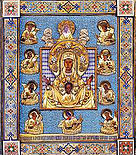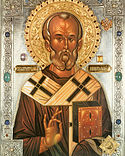Bishop Sophrony’s Nativity Epistle
Afterwards he was seen upon earth,
and conversed with men (Baruch 3:38).
O my soul, not only on this day glorify with the shepherds, follow the star, bring gifts with the Magi, rejoice with the Angels, sing with the Archangels, but do this every day, for you are called to this, and not to the earthly. But all loved the earth and began to prefer it to Heaven so that there was no hope of salvation left except for Divine assistance. If the Lord had sought glory for Himself, He would have come to the Angels. Why did He come to us, what can He find here except a manger and a Cross?
The purpose of God’s coming to earth was to attract everyone to Heaven. His infinite Love for us brought Him to earth, and for this, He suffered on the Cross, but He suffered voluntarily, and at the same time the devil continued to fight with God – not with the unveiled God, however, but with God hidden under the veil of human flesh. We see how the laws of nature are violated: why does the Uncontainable One fit in the womb? How is the All-Containing One carried in the womb of a woman? How does the Virgin give birth and remain a virgin? By this, we are called to live not according to our nature, but according to the commandments given by God. There are two natures in us – earthly and heavenly, body and soul – so let us then distinguish between what is of the blood, the soul, and the flesh from what is spiritual. Fulfilling Christ’s commandment, not out of passionate infatuation, but for the sake of Eternity, for the sake of God, is always associated with a struggle, with forcing one’s will. For failure to fulfill His commandments, God threatens us with Gehenna — not in order to plunge us into it, but to give us the opportunity to avoid this severe punishment. But we do the opposite, and every day we strive on the path leading to Gehenna. God commands us not only to listen to the Gospel or to know the main points of Christ’s earthly life but also to fulfill what He tells us. We even interpret the commandment to love one’s neighbor differently than it is taught by the Church. We sometimes mistake feelings that are contrary to the spirit of the Gospel for elevated, God-pleasing feelings. By our fallen nature, we try to fulfill the commandment to love one’s neighbor, and nature tells us what kind of neighbor he is, what his actions are, whether he deserves my love or attention, whether he fasts, how often he goes to church… The Gospel does not list these qualities, but says: “…love your neighbor as yourself.”
The teaching of the Church tells us how to love our neighbor: “Do not be angry and do not bear malice toward him; do not allow yourself to say any reproachful, abusive, mocking, or caustic words to your neighbor; keep peace with him as much as possible; humble yourself before him, work on yourself, not on him; do not take revenge on him either directly or indirectly; give in to him in everything in which you can give in to him; wean yourself from contradiction and dispute, reject them as a sign of pride and self-love; speak well of those who revile you: repay good for evil; pray for those who hurt you with various insults, offenses, misfortunes, and persecutions (Matt. 5:21–48). In no way, under any pretext, condemn anyone, do not even judge anyone, whether he is good or bad, having before your eyes that one bad person for whom you must answer before God—yourself. Do unto your neighbors as you would have them do unto you (Matt. 7:1–12). Release and forgive from the depths of your heart the sins of men against you, so that your heavenly Father may forgive you your countless sins, your terrible sinful debt, which can cast you down and imprison you forever in the dungeons of hell (Matt. 18:23–35).”
A believer can be recognized in everything: by his gait, by his gaze, by his appearance, and by his voice. We must cultivate decency in ourselves not for show, but for the benefit of those who look at us. Beloved, let us try to re-examine ourselves daily, whether the coming of God to earth, which we celebrate today, is justified in our actions and words.
I greet all the venerable pastors, monastics and parishioners of our diocese:
– Christ is Born!
+ Sophrony, Archbishop of St. Petersburg and Northern Russia
Nativity 2024/2025

